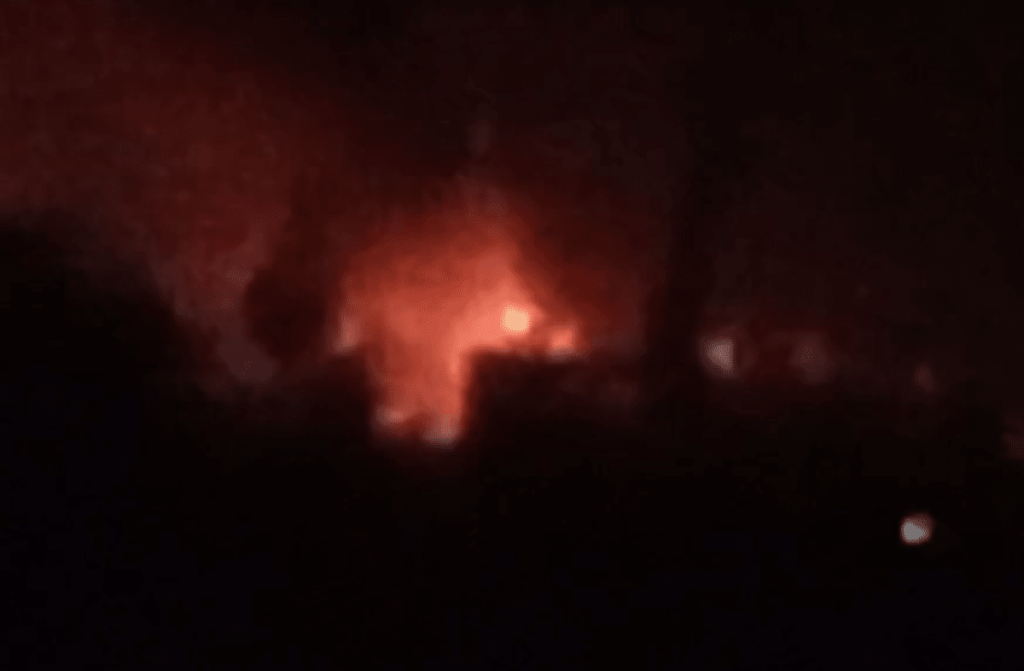A Ukrainian drone sparked a fire at an oil refinery in southern Russia early on Sunday, according to a Russian regional official, as Kyiv intensifies its drone campaign on Moscow’s oil infrastructure. Russia’s Defense Ministry reported that a number of Ukrainian attacks were intercepted across several regions overnight, including one drone over the Volgograd Oblast. The uncrewed aerial vehicle (UAV) fell and detonated, causing a fire at the Volgograd oil refinery, which was extinguished with no casualties. Kyiv has been targeting Russia’s oil refineries with long-range drones to disrupt Russia’s oil exports and weaken its war efforts, despite Russia’s major position in the global market and Western sanctions on its oil sector.
Russian Telegram channels shared footage purportedly showing a fire at a Russian oil refinery in the Volgograd region, caused by an uncrewed aerial vehicle falling and detonating at the facility. Ukraine has been discreet about claiming responsibility for attacks on Russia’s oil refineries to avoid conflict with its Western allies, who fear global oil price spikes and retaliation. However, Kyiv has defended its actions, considering oil refineries as legitimate military targets. The head of Ukraine’s Security Service has confirmed Kyiv’s role in such strikes, with previous attacks on the Volgograd refinery reported earlier in the year. Several Russian Telegram channels published footage of the blaze at the Volgograd facility, though Newsweek was unable to independently verify the footage.
Recent reports indicate that Ukrainian long-range drones struck the Volgograd refinery using a UAV operated by Kyiv’s military intelligence agency. Ukrainian drones also targeted an oil refinery in the Bashkortostan region, nearly 1,000 kilometers from Russia’s border with Ukraine. Russian state-controlled media reported that Ukrainian forces had attacked an oil depot in the Moscow-annexed Luhansk region, causing a significant fire. The Kremlin has annexed parts of eastern Ukraine and laid claim to additional regions, including the Crimea peninsula. The Russian-installed head of the Luhansk region confirmed three casualties in an attack on the Rovenki oil depot. Furthermore, a Ukrainian drone reportedly targeted an oil refinery in the Kaluga region, causing a fire in an industrial area to the northwest of the city.
The intensification of Ukraine’s drone campaign on Russia’s oil infrastructure is part of Kyiv’s efforts to disrupt Moscow’s resources and weaken its war efforts. Despite concerns from Western allies about potential repercussions including global oil price spikes, Ukraine views oil refineries as legitimate military targets. Russian regions have experienced multiple drone attacks on refineries, with footage shared on social media platforms showing the aftermath of these strikes. Recent incidents include attacks on oil facilities in the Volgograd, Bashkortostan, and Kaluga regions, as well as reports of an attack on an oil depot in the Moscow-annexed Luhansk region. The annexation of Ukrainian territories and ongoing conflict in the region have fueled tensions between Ukraine and Russia, prompting Kyiv to continue its drone attacks in an attempt to weaken Moscow’s military capabilities.
The ongoing drone attacks on Russian oil refineries by Ukrainian forces are part of Kyiv’s strategic efforts to disrupt Moscow’s oil exports and weaken its ability to sustain its war efforts. Despite concerns from Western allies about potential consequences, Ukraine considers these refineries legitimate military targets. Multiple regions in Russia have been targeted by Ukrainian drones, leading to fires and significant damage at oil facilities. The conflict between Ukraine and Russia, including the annexation of Ukrainian regions by Moscow, has heightened tensions between the two countries and fueled Kyiv’s determination to continue its drone campaign against Russian oil infrastructure. The consequences of these attacks, including economic impacts and potential retaliatory actions, remain a source of concern for international observers.


